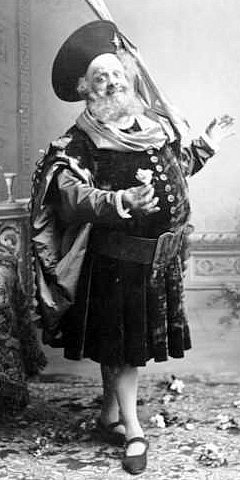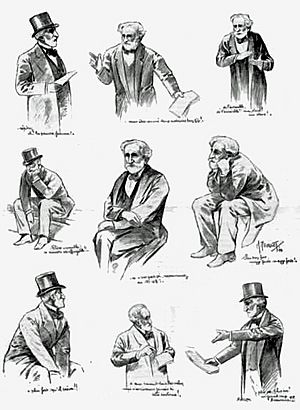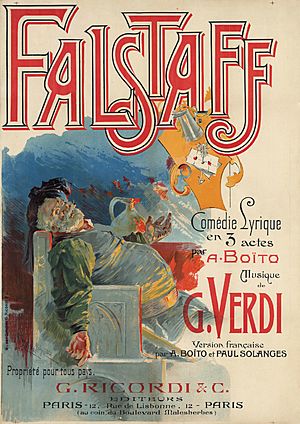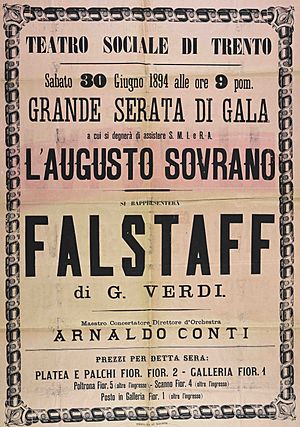Falstaff (opera) facts for kids
Quick facts for kids Falstaff |
|
|---|---|
| by Giuseppe Verdi | |

Lucien Fugère as Falstaff in 1894
|
|
| Librettist | Arrigo Boito |
| Language | Italian |
| Premiere | 9 February 1893: La Scala, Milan |
Falstaff is a funny opera (a play set to music) by the Italian composer Giuseppe Verdi. It has three acts. The story, called the libretto, was written in Italian by Arrigo Boito. He based it on plays by William Shakespeare, especially The Merry Wives of Windsor. The opera first opened on February 9, 1893, at La Scala in Milan, Italy.
Verdi wrote Falstaff when he was almost 80 years old. It was his very last opera, out of 26 he composed. It was also his second comedy. The story is about a big, funny knight named Sir John Falstaff. He tries to trick two married women to get their husbands' money. But the women are very clever and turn his plans into a big joke!
Verdi was a bit worried about writing a new opera at his age. But he really wanted to create a comedy. He loved the story idea that Boito suggested. It took them three years to finish the opera. Many people were excited about a new work from Verdi. But Falstaff was not as popular as his other operas at first. After its first shows, it was not performed much. Later, a famous conductor named Arturo Toscanini helped bring it back. He made sure it was performed again in Italy and New York. Today, Falstaff is a regular part of opera shows around the world.
Contents
Creating the Opera: A Fun Project
Verdi did not write Falstaff because someone asked him to. He wrote it just for fun! He did not even plan for it to be performed at first. When he finished, he thought it would be his last work. And it almost was. It was his final opera and his last big piece of music.
When composers turn plays into operas, they often change the story. This helps it fit with the music and singing. Verdi had already made two other Shakespeare plays into operas. These were Otello and Macbeth. For those, he worked hard to keep them very close to Shakespeare's original plays. But with Falstaff, he took more freedom. The character of Falstaff in the opera is very much like the one in Shakespeare's Henry IV plays. This is different from how Falstaff appears in The Merry Wives of Windsor.
First Performances: A Big Hit
The very first show of Falstaff was at La Scala in Milan. This happened on February 9, 1893. It had been almost six years since Verdi's last opera premiered. For the first night, tickets cost 30 times more than usual! Kings, queens, important people, and critics came from all over Europe. The show was a huge success. The audience loved it and made the performers repeat some parts. At the end, people clapped for Verdi and the singers for a whole hour. Verdi, his wife, and Boito got a big welcome at their hotel too.
Over the next two months, the opera was performed 22 times in Milan. Then, the same group of performers took the show to other cities. These included Genoa, Rome, Venice, and Vienna. Verdi made many changes to the music after these first shows. He wanted to make it even better.
Falstaff was soon performed outside Italy. It was shown in Trieste and Vienna in May 1893. Then it traveled across Europe and to the Americas. In January 1894, Gustav Mahler conducted the opera in Hamburg, Germany. A Russian version was performed in St. Petersburg that same month. Paris was a very important city for opera. For the Paris show in April 1894, Boito helped translate the libretto into French. This translation was approved by Verdi. The first show in London was on May 19, 1894. It was performed in Italian. On February 4, 1895, the opera first came to the Metropolitan Opera in New York.
Characters in the Opera
Here are the main characters in Falstaff and the types of voices they sing with:
| Role | Voice type | First singer, February 9, 1893 Conductor: Edoardo Mascheroni |
|---|---|---|
| Sir John Falstaff, a fat knight | bass-baritone | Victor Maurel |
| Ford, a rich man | baritone | Antonio Pini-Corsi |
| Alice Ford, his wife | soprano | Emma Zilli |
| Nannetta, their daughter | soprano | Adelina Stehle |
| Meg Page | mezzo-soprano | Virginia Guerrini |
| Mistress Quickly | contralto | Giuseppina Pasqua |
| Fenton, one of Nannetta's boyfriends | tenor | Edoardo Garbin |
| Dr Caius | tenor | Giovanni Paroli |
| Bardolfo, a friend of Falstaff | tenor | Paolo Pelagalli-Rossetti |
| Pistola, another friend of Falstaff | bass | Vittorio Arimondi |
| Mine Host of the Garter Inn | silent | Attilio Pulcini |
| Robin, Falstaff's helper | silent | |
| Also: townspeople, Ford's servants, and people dressed as fairies. | ||
Images for kids
-
Victor Maurel as Iago in Verdi's Otello
See also
 In Spanish: Falstaff (Verdi) para niños
In Spanish: Falstaff (Verdi) para niños
 | Kyle Baker |
 | Joseph Yoakum |
 | Laura Wheeler Waring |
 | Henry Ossawa Tanner |










